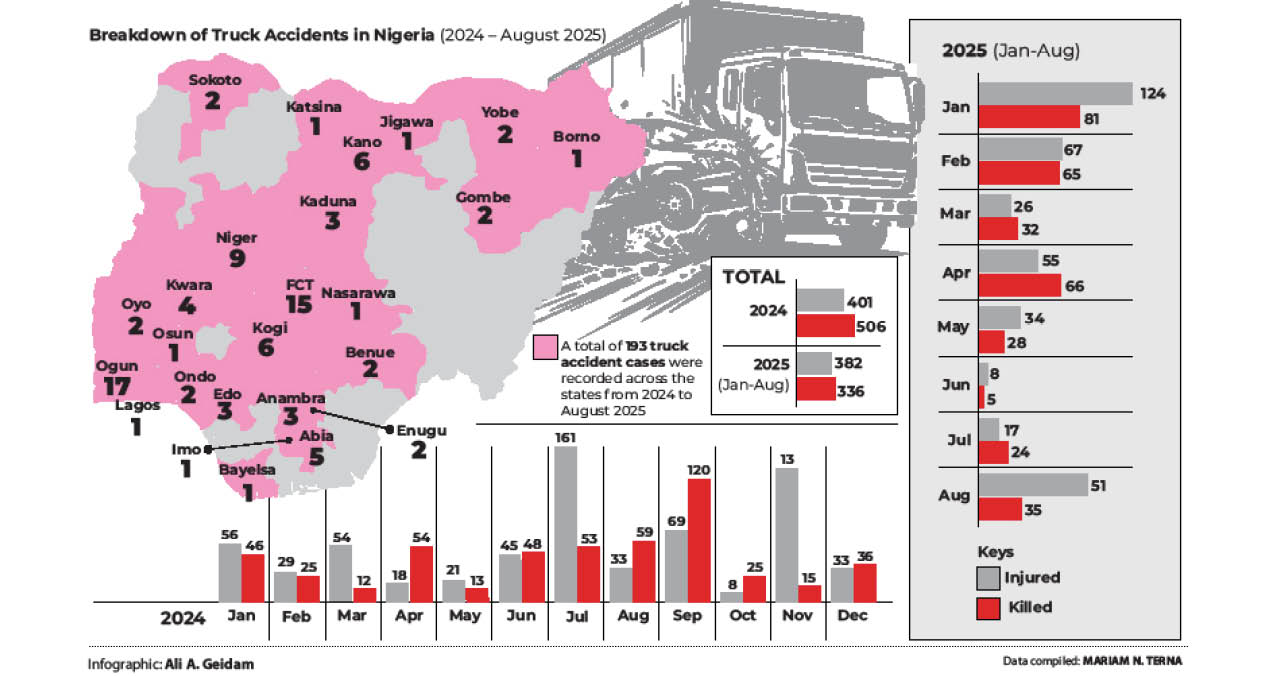News
842 Killed, 922 Injured In Truck Accidents In 2 Years

No fewer than 1,764 Nigerians were involved in truck accidents across the country in 2024 and 2025 which still has three mounts to go, data atacompiled by Weekend Trust Library has shown.
Out of the above figure,842 persons lost their lives while another 922 sustained varying degrees of injury in crashes recorded in at least 21 states and the Federal Capital Territory (FCT). With increased calls by motorist and the general public for tangible punishment for violating truck drivers and its companies growing daily in the country, many resorting to taking actions against the drivers and in most cases destroying the truck and their goods. Weekend Trust spotlights the agony victims of these accidents go through, most times without compensation.
‘Our ordeal’
Prominent amongst the cases in 2025 is the truck incident that involved a Dangote Truck in Edo state where a student Ruth Otabor, sister to Nigerian celebrity Ijeoma Josephine Otabor aka Phyna of Big Brother Naija a popular tv reality show in the country was said to have been hit by a truck while in front of her school.
…..What was meant to be a season of celebration quickly turned into tragedy for the Otabor’s six days after graduating from Auchi Polytechnic in Edo State, Ruth Otabor’s life was cut short following a collision with a Dangote truck near the school gate.
The incident, which happened on August 13, 2025, left her with catastrophic injuries, including an amputated leg, a series of battle for compensation between her family and the affected company which trended on the internet for weeks. Despite efforts to save her, Ruth succumbed to complications on August 31, leaving behind grief-stricken relatives and a wave of public outrage.
Phyna, elder sister of the late Ruth, turned to social media to vent her anguish and call for accountability. In one of her posts, she wrote: “Na money you get, you no be God. But my God is bigger. Enough is enough.”
In another message, prior to the death of her sister, Phyna lamented the delays in getting Ruth flown abroad for urgent treatment. “We had an agreement that we are only bringing my sister to Lagos. She cannot be treated in Nigeria,” she wrote, pressing for faster action. Her words showed desperation of a family caught between hope, bureaucracy and power.
Another relative, speaking from the family home in Kosofe, Lagos, described Ruth was “a cheerful girl, always smiling and helping everyone around her.” They recalled how she had just completed her studies, only to have her dreams snatched away. “We were still celebrating her graduation when we got the call about the accident,” the relative said. “Now we are preparing for her burial. The pain is too much.”
Eyewitnesses had told newsmen after the accident that the heavy-duty truck, which hit Otabor, crushed her leg and did not stop before it was eventually chased and stopped by a bystander.
Ruth’s death drew public outrage and calls for action to be taken to curb incessant truck accidents in the country.
In Niger State, one of the victims of truck crashes is Ndayawo Majin, a resident of Agaie town. He lost one of his legs and his right eye after being knocked down by a trailer in September 2019.
Majin, a veterinary officer at the State Ministry of Agriculture, held back tears while speaking to Weekend Trust as he recalled his experience, saying his life has never been the same since the incident.
He narrated, “On September 14, 2019 at 4.30pm on my way to a livestock farm to inject some animals, a trailer coming from behind tried to dodge a pothole filled with water and pushed me down. Before I could react, the trailer crushed my leg, along with my motorcycle. My leg broke completely.
“Since that day, I knew my life would not be the same again. After I was discharged from the hospital, I retired from service, but because some farmers were already familiar with my expertise, some bring their animals to my house for treatment, while others come to pick me up for on-site visits.
“I spent 44 days in the hospital. It wasn’t just me, my family was also traumatised. But I told them not to worry; it was destined by God. Before the incident, I used to go to the stream every morning to fetch water by myself, wash and iron my clothes. Now, all of that have to be done for me.”
He appealed to the government to take action regarding heavy trucks, saying that what happened to him has happened to many others; and some of them have died.
“I witnessed about five similar incidents before mine. Speeding in Agaie town is rampant, so I am begging the state and the federal government to construct speed breakers to control excessive speeding by truck drivers,” he said.
In Kano, a survivor of a truck accident that crushed worshippers after Friday prayers, Yunusa Yusuf Imawa, said he “escaped death by the whiskers” but lost four of his staff in the tragic accident.
Imawa recalled that his colleagues had just finished prayers by the roadside when the speeding truck veered into them after its brakes failed.
He sustained bruises on his leg and hands but described his survival as an act of destiny. “I lost four boys working with me on the spot. It was God’s destiny that I survived,” he said.
In Lagos, an event coordinator from Ogun State, Arigbabu Samuel, recounted how he survived a fatal auto crash this year when the commercial bus he boarded rammed into a moving truck at Gbagada.
He said three passengers died instantly while others sustained varying degrees of injury. Samuel, 29, said he owed his survival to what he described as a “supernatural jump” that pushed him out of the bus at the moment of impact.
“I had to jump out through the door, though it was a supernatural jump because I did not understand how I jumped. I only sustained little injuries on my legs and shoulders,” he explained.
Samuel said he now appreciates life better after the accident, having witnessed the tragic loss of fellow passengers.
506 killed, 540 injured in 204 truck accidents
The 2024 data showed that Niger State topped the death toll with 78 fatalities, while Kano recorded the highest number of injuries with 127 victims. Kaduna followed closely, accounting for 61 deaths and 51 injuries, while Ogun State recorded 40 deaths and 93 injuries.
The Federal Capital Territory (FCT) also witnessed a high casualty figure with 35 deaths and 65 injuries, underscoring the nationwide spread of the menace. Abia State recorded 47 deaths, while Kogi and Kwara had 32 and 40 deaths respectively.
A further breakdown geopoliticalshowed that the North-Central accounted for the highest toll with 265 deaths and over 150 injuries. States in this zone include Niger, Kwara, Kogi, Benue, Nasarawa and the FCT, which collectively bore the heaviest burden.
The North-West followed with 141 deaths and about 195 injuries, driven mainly by high figures from Kaduna (61 deaths, 51 injuries) and Kano (39 deaths, 127 injuries). The South-West recorded over 120 deaths and injuries, largely from Ogun, Oyo and Lagos.
The data also shows worrying cases from the South-East and South-South zones. Abia and Enugu together recorded 51 deaths and 36 injuries, while Ondo alone accounted for 16 deaths. In the North-East, Borno had 3 deaths and 30 injuries, while Yobe recorded 12 deaths.
These figures revealed the dangers posed by heavy-duty trucks plying Nigerian highways, many of which are either poorly maintained or operated by drivers without adequate safety training. Analysts say the concentration of deaths in Niger, Kaduna, Kano and Ogun suggests that major transit routes and interstate corridors are at the heart of the crisis.
Road safety experts have consistently called for stricter enforcement of traffic regulations, periodic safety audits for haulage companies and the rehabilitation of critical road infrastructure.
718 persons affected in 2025 truck accidents
At least 718 persons were involved in truck accidents across Nigeria in 2025 which is about four months away from 2026. Eight months into the year 2025 reports show that 336 people were killed and 382 injured in incidents recorded during the year.
The figures, compiled from reported cases by the national dailies shows that Kano State had the highest toll with 59 deaths and 61 injuries, followed by Niger with 54 deaths and 66 injuries, Kogi with 34 deaths and 73 injuries, and the Federal Capital Territory with 29 deaths and 72 injuries. Ogun recorded 37 deaths and 37 injuries, while Edo had 23 deaths. Other states with double-digit fatalities included Benue (14 deaths), Anambra (16 deaths), Kwara (15 deaths and 3 injuries), Gombe (12 deaths and 44 injuries), Kaduna (10 deaths and 6 injuries), Yobe (10 deaths and 3 injuries), and Sokoto (9 deaths).
In addition, Enugu recorded 6 deaths, Ondo 4 deaths, Osun 2 deaths and 15 injuries, and Bayelsa 2 deaths and 2 injuries.
In terms of frequency of accidents, the data shows that FCT topped with seven incidents, followed by Niger and Ogun with six each. Edo, Kano, and Kogi recorded three accidents each, while Anambra had two. Bayelsa, Benue, Enugu, Kaduna, Kwara, Ondo, Osun, Sokoto, and Yobe each recorded one incident.
Several major highways stood out as some of the most dangerous in 2025, recording the highest number of deaths and injuries from truck crashes. Along the Kano-Maiduguri highway around Muhammadu Buhari flyover, 23 people died while 48 others sustained injuries, making it one of the deadliest spots in the country. Similarly, on the Lambatta-Lapai road in Niger State, 28 deaths and 35 injuries were recorded, ranking it among the most tragic routes in the year under review.
The Lokoja-Obajana road in Kogi State also proved to be a high-risk corridor, with 19 deaths and 8 injuries recorded. In the same state, the Zone 8 Roundabout in Lokoja claimed 9 lives and left 60 others injured. These figures underscore why Kogi remained one of the most affected states in terms of casualties.
Other black spots included the Zaria-Kano highway, which claimed 21 lives and injured 3 persons, and the Chiromawa village axis in Garun Malam LGA of Kano State, which left 15 dead and 10 injured. In the South-West, the Ikorodu-Sagamu road in Ogun State was among the deadliest, with 18 deaths and 4 injuries, alongside multiple crashes on the Lagos-Ibadan expressway that claimed several lives.
In the Federal Capital Territory, the busy Abuja-Lokoja highway and its adjoining routes accounted for dozens of victims. Notably, the section around Gada-Biyu on the expressway claimed 6 lives and injured 14 others, while another stretch near Manderegi recorded 6 deaths and 4 injuries. The Madala-Zuba highway also had a share of fatalities and injuries.
FRSC blames mixed loading
The then Niger State sector commander of the Federal Road Safety Corps (FRSC), Kumar Tsukwam, who was in the command during the year under review, said the high casualty figure recorded in Niger State in 2024 was a reflection of systemic problems in the country’s road transport sector.
According to him, one of the major causes of truck accidents was the dangerous practice of mixed loading, where drivers carry human beings, animals and goods inside trailers.
“We discovered that most of these vehicles are not only overloaded but also carry passengers in unsafe conditions. This puts lives at great risk whenever accidents occur,” he explained.
Tsukwam noted that Niger, being a major transit corridor linking the North to the South, particularly along the Bida-Mokwa-Ibadan route, faced peculiar challenges.
“Because of the economy, many people use trailers as a means of cheap transportation. Drivers take advantage of this by loading passengers at the roadside, collecting as little as N2,000 from each person. If they carry up to 200 people, that is a quick N100,000 for them,” he said.
The commander disclosed that much of this illegal loading happens without the knowledge of the truck owners as drivers exploit the loopholes for personal gain.
“Many of them are supposed to be carrying grains, but they still go ahead to load people at their own risk,” he added.
On efforts to curb the menace, Tsukwam said the FRSC under his watch embarked on both enforcement and public education. “When I was there, I personally dislodged close to 4,000 passengers from such vehicles at different checkpoints. We also engaged stakeholders, including city authorities and depot operators, to discourage the practice from the source,” he said.
He stressed that lasting solutions would require joint action from authorities at federal, state and local levels, as well as continuous sensitisation of road users.
Overview of cases
Daily Trust had on August 6 2024, reported that 22 people died and 20 others sustained serious injuries in a lone fatal crash involving a trailer on the Lambata-Lapai road in Niger State. The incident, which occurred around 3am, involved 42 passengers and livestock on board.
The state sector commander of the FRSC, Aishat Sa’adu, who confirmed the incident, according to the report, said the trailer had taken off from Kano and was heading to Lagos when it crashed, about 10 kilometres from Lambata and 30 kilometres to Lapai town.
Similarly, Daily Trust reported that no fewer than 80 lives were lost on the Lambata-Bida road between October 2024 and August 2025. Several livestock were also killed during the period. One of the most tragic cases was recorded on September 8, 2024 when a petrol-laden tanker overturned near Man-Woro village on the Lambata-Lapai-Agaie-Bida road, spilling its contents before exploding.
The report noted that inferno engulfed a moving trailer carrying cattle and passengers, as well as a commercial vehicle, claiming 45 lives and 50 cows. The trailer had departed Wudil in Kano for Lagos, while the passenger vehicle was heading to Agaie market.
In another major accident, Daily Trust reported that 21 people were killed along the Abuja–Kaduna expressway on September 12, 2024. The crash, which happened in the early hours of that fateful day, involved a trailer truck and a passenger Hummer bus heading to Kano and Batsari in Katsina State. FRSC officials who took part in the rescue opeartion said three survivors were rushed to the Umaru Musa Memorial Hospital in Sabon-Wuse, while the remains of the deceased were deposited at the hospital’s morgue.
These are not the only accidents that happened, but the prevalent of the recurrence of accidents makes roads unsafe for commuters and even passerby.
Truck drivers give reasons
Bello Yahaya, the secretary of the Truck Drivers Association, Minna Farm Centre branch, attributed the incessant crashes involving heavy-duty vehicles to the deplorable state of roads across Nigeria, drug abuse, over-speeding, dangerous overtaking and lack of enforcement of road safety regulations by the government.
“The way trucks were driven during our time is completely different from now. At that time, there weren’t as many heavy-duty vehicles on the roads. Secondly, we didn’t over-speed like today’s drivers do. Even if someone decided to speed, the roads were in good condition. Now, they are terrible. We didn’t suffer on the roads the way drivers do now. It is quite unfortunate that drivers spend days on the road now before reaching their destinations. For instance, on the Badeggi-Kaduna expressway, sometimes drivers spend up to three days due to the bad condition of the road. Between Badeggi and Lapai is where heavy-duty vehicles usually fall.
“These frequent accidents are a direct result of our poor roads. If the government can fix the roads from Bida to Lapai, Dikko to the Kaduna expressway and from Tegina to Zungeru and Minna, as well as Zungeru to Lemu, the crashes would drastically reduce.
“Also, regarding the issue of over-speeding, the government has so many traffic officials, but most of them don’t do their jobs. They just stay in one spot extorting drivers and letting traffic violators go scot-free. The government should station traffic officials across various road points. What is the essence of employing them if they don’t do their work? What is the role of the Federal Road Safety Corps and other traffic enforcement agencies employed by various states? They should be patrolling the highways; instead, they focus on collecting bribes from motorists.
“On our part, we usually warn our drivers to drive safely because the roads are in bad shape. But traffic regulators also need to do their part.
“One major challenge we face today with our drivers is drug abuse. The new types of trucks are swift and easy to steer. Because of drugs, some drivers don’t even realise when they lose control of their vehicles. We warn them regularly, but we can’t always tell when they are under the influence of drugs. When they are, they often engage in dangerous overtaking and other reckless behaviours. The government must do more to tackle drug abuse, especially among drivers.
“The government should also build tollgates to track the number of trucks using the roads. With tollgates, the government can even recoup the funds used to fix the roads, even if they charge each truck N1,000 daily.
“I urge the government to fix our roads, even if it means installing tollgates to recover the money. Secondly, road safety enforcement agencies must be held accountable. The government should also construct speed breakers in towns and villages to reduce over-speeding,” he said.
(Daily trust)
-

 Business12 hours ago
Business12 hours agoDangote Refinery to Supply 65m Litres of Petrol Daily
-

 Metro10 hours ago
Metro10 hours agoCourt ruling didn’t exempt states – Group tells Lagos AG over VIO activities
-

 News11 hours ago
News11 hours agoFG Rejects US Congressmen’s Stance On ‘Religious Persecution’
-

 Politics12 hours ago
Politics12 hours agoObi, Oyegun, Other ADC Chieftains Attacked In Edo
-

 News12 hours ago
News12 hours agoAlleged UK property fraud: Ozekhome faces 12 fresh charges
-

 Politics10 hours ago
Politics10 hours ago‘A stain on democracy’ — ADC condemns attack on Obi, party chieftains in Edo
-

 News10 hours ago
News10 hours agoUS Push To Scrap Sharia Sparks Outrage
-

 News11 hours ago
News11 hours agoPROFILES: The DIGs Who May Be Affected By Disu’s Appointment


















